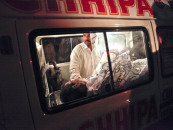City’s water not properly chlorinated: Health experts
People told to take precautions to avoid Naegleria, dengue and Congo virus.

In ‘Naegleria, Dengue, Congo - Fatal Diseases’, an awareness seminar organised by the Karachi Arts Council, speakers advised the public to take precautionary measures on their own, since all three diseases were preventable and a little effort could avert much loss.

“Cases of Naegleria Fowleri are not being reported in other countries, but we have been witnessing them every year for the last six years,” said Dr Afia Zafar, Aga Khan University’s head microbiologist in the pathology and microbiology department. “It is preventable in 100 per cent of the cases but fatal in 99 per cent of them.”
Briefly explaining the causes and preventative methods for the three diseases, Dr Zafar said that dengue occurs in summer, while the Crimean-Congo haemorrhagic fever is carried by ticks on animals from Balochistan and Afghanistan. She added that Sindh’s animals do not have the carrier ticks.
“The chlorination results are unsatisfactory,” disclosed Sindh additional health secretary Dr Muhammad Aslam Pechuho. “This is not an ordinary issue.” Pechuho was of the view that the KWSB’s failure hinged on financial problems.
“Yes, there are several areas that indicate inadequate levels of chlorine,” Karachi commissioner Shoaib Ahmed Siddiqui agreed. “These diseases exist in Karachi and we must overcome the lack of coordination between departments to fight them.”
Meanwhile, Karachi Metropolitan Corporation senior medical services director Dr Zafar Ejaz expressed serious concerns about the KWSB, revealing that approximately half of the water samples taken from various areas within the city lacked the required chlorine level.
Dr Ejaz said that although two patients of Naegleria Fowleri survived, this is very rare, and a medical committee should be formed to investigate it. He also recommended that all animals being brought into the city ahead of Eidul Azha should be screened to counter the Congo virus.
On the other hand, Naegleria committee focal person Dr Irfan Ahmed down played the danger, claiming that everything was under control.
The speakers emphasised that all three diseases were preventable and that mortality rate can be minimised with better measures.
Published in The Express Tribune, September 18th, 2014.



















COMMENTS
Comments are moderated and generally will be posted if they are on-topic and not abusive.
For more information, please see our Comments FAQ